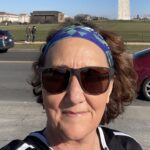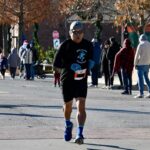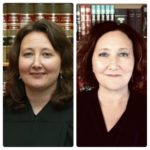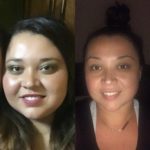
It was high time we let a man tell his health story around here, so I reached out to my friend and Indian law colleague Rob Saunooke. He was recently featured here by the American Bar Association for his career accomplishments.
Within the legal profession, there are many times when American Indian voices are absent (or nearly so) and he has been our champion time and time again. I want to publicly thank him for that here. Simply showing up and being present to represent us REALLY matters and he’s done a lot of that, on his own dime, ensuring that we had a seat at the table in national organizations that carry a big weight. He’s also served as the President of National Native American Bar Association.
And he nearly died on us. This post is particularly for our lawyer friends and others in high stress jobs – burning the candle at both ends for years and years. You know who you are.
Here’s Rob’s health story:
“My journey to wellness, both mentally and physically, has taken the past 8 years of my life and has been filled with ups and downs; starts and stops; and finally resolve and commitment. It all began when I thought I was invincible. 48 years old and still working out daily like I did when I was 20. I could eat anything because I was active. Years of playing football at every level followed by an aggressive legal career including appearances on television; before the US Congress and almost every appellate court in the country.
I was the picture of health, thinking that I was doing everything right and that nothing could stop me or prevent my next challenge from being overcome. That was my day to day, or so I thought.
While I was getting ready to attend my oldest son’s graduation in San Francisco in 2012, I found myself gasping for air and had to ask my wife to call 911. There is something about not being able to breathe that enhances an already uncertain condition. The sense of drowning while being above water with air all around you, but you are not able to catch your breath. Trying to force your lungs to work and your diaphragm to pull yet no matter how hard you try nothing fills your chest.
Will you pass out?
Will you ever catch your breath?
Why can’t you just calm down and breathe?
As the ambulance rushed me to the hospital I listened to the EMT tell me over and over to calm down and just take a breath. I fought the urge to smack him and simply said “I am trying.” At the hospital the tests begin. No quick diagnosis. Looking for blockage or perhaps a blood clot. Blood pressure normal. CAT scans and numerous blood draws all yield no indication as to why I simply cannot catch my breath. I notice that my stomach is tight and enlarged as if I have a belly full of fluid. The pressure hinders my diaphragms ability to expand and contract thereby contributing to my breathing difficulty.
No blockage. No blood clots. Nothing indicating any immediate issues. Finally, after an EKG and MUGA scan I hear the words “Congestive Heart Failure” or CHF. What the hell is that? The doctor then tells me that my heart is pumping at 12% when it should be pumping at 60%. (its called the “ejection fraction”) I learn the meaning of medical terms that I never wanted to know. In short my heart is enlarged on one side which makes it harder to push blood and filter fluids through my veins. This in turn causes fluid to build up, taxes the heart muscle, and ultimately “SUDDEN CARDIAC DEATH”. No warning or pain. Your heart just gets tired of trying to push and stops working.
The doctor informed me that CHF is brought on by five factors: Stress, Diabetes, Smoking, Obesity and Alcohol. He asks what I do for a living and I tell him I am an attorney and immediately he checks of the Stress box. I am not diabetic but have been in pre diabetic status for a few years. I don’t smoke but I am 6’3” and have been over 300lbs since I was 18. (College football linemen are rarely below that weight).
Then the doctor asks me about alcohol and I honestly tell him that I am a social drinker. You know the type. Someone who drinks with friends and at dinner. Curiously the doctor asks me what I mean by social drinker and how much do and how often does it occur. I give him a run down on my daily and weekly consumption and he states very plainly “Oh I see, you’re an alcoholic.” I am informed that if I continue to drink at the level I have been drinking it will kill me.
I leave the hospital with more questions than answers; instructions; suggestions and fear. The shock and uncertainty is balanced by my wife’s resolve. She immediately begins to try and find a way to save my life by researching anything and everything on CHF causes and cures. After a short period of time she announces that we are going totally vegan and the journey to recovery begins.
For the next 90 days I eat nothing but vegetables. My wife prepares them in ways I did not think possible. She grinds up walnuts and cashews then add seasoning so that it tastes and looks like ground beef. Slowly over the next 6 months my ejection fraction increases and actually rises to almost 46%. Still not at a normal level but better than where I was.
I quit alcohol totally and change my daily routine. I start riding my motorcycle on long distance journeys. It gives me time to meditate and disconnect from daily stress, clients and phone calls. On the road I find a calm and the opportunity for contemplative thought where I am able to solve all the worlds problems, at least I do in my own little world of thought.

Over the next few years I again start to feel comfortable in my day to day life. I end my totally vegan diet and relax my attention to day to day dieting and nutrition. Slowly over time I again start drinking and return to the old routine of a few drinks each night. I regularly see my doctor and all tests, including ejection fraction tests, are normal and within appropriate ranges. As before I find myself relaxing into the day to day of life and not paying attention to what was so very important to my life in 2012.
Bring on 2020. Pandemic, political stress, a move from Florida back to my reservation in North Carolina and then a series of unfortunate events. In March, I purchase a classic 1965 Thunderbird Convertible. Mint condition and a long time dream realized. While driving this dream car in the mountains of North Carolina the brakes go out and I find myself careening down the Blue Ridge Parkway. Options are few. Go over the mountain to certain death or crash into the mountain and hope I survive. I choose the mountain and put my head through the windshield totaling the car but leaving me relatively unscathed.
A few months later I notice my left eye having issues. A quick visit to the optometrist determines that the retina has detached and surgery is scheduled immediately. One nitrogen bubble and a scleral band later I find myself face down in recovery. Anticipating six weeks of recovery I start to feel the familiar return of bloating and shortness of breath I had felt in 2012. I try to relax but it does nothing to ease my breathing. I quickly head to the ER during the pandemic for help and again hear the familiar phrase “Congestive Heart Failure” only this time it is brought on by the fluids that were used during my surgery.
I spend a week in the hospital draining 20lbs of water weight and learn that my heart is only pumping at 8% of capacity. I realize that it is my own fault. That I had the chance to change my trajectory and instead fell back into old habits and ignored warning signs. I am again reminded that my return to regular alcohol consumption and poor diet choices only sped up my condition.
This time there is no turning back. For the next three months I recommit myself to paying attention to diet and increasing exercise. I quickly lose 50lbs and six inches from my waist. I think that this time I will get it right. I spend a few days reconnecting to the road by riding to New Mexico and then to Florida and back to Cherokee. I reflect on mistakes made over the past few years and how I let my guard down on my own health.
Wellness. Still not really sure what that means.
Is it an action or a state of mind? Is it what we take into our bodies or what is forced on us from our environment? Is wellness something we control or is it simply finding a personal peace in the place where we are day to day? I am not sure that I know the answer. However, I do know that in the past 8 years I have had two chances to learn that my mind and body is not where is should be. I know that I have been given the chance to correct mistakes and heal myself.
I found over time that my environment, i.e. my friends, family, and now social profile, were contributing to stress and health issues. I have had to relearn how to interact with others in all aspects of my life. Learning that although everything I experience is personal to me I should not internalize and take it personally. In the words of the Taoist Philosophy I must “be like water and flow around the rock”.
My wellness journey is clearly lifelong as everyone’s journey should be. Like most I took it for granted when I should have been listening to the tell-tale signs. Like most I believed I could put off attention to the little details to pursue other things. The adage “little strokes brings down might oaks” could not be more true.
Certainly, my diet has changed but more than deciding simply what am I putting into my body I find that during this second time around it is my approach to all aspects of my body that is more important. Mental, spiritual, intellectual and most importantly my harmony within my environment is what I focus on. My ability to process what I take in is directly impacted by what I do every day.
My first warning made me reactionary. I took steps to fix what was happening. Now I am invested in changing myself. Now I am preventative and anticipating what might lay ahead and altering my behavior and choices in a more defensive posture. I find much of my Native American roots helps me feed this new goal. Listen more than speak. Determine what my actions impact on the world around me might be prior to acting. Looking at the simple as affecting the complex.
Wellness is no longer simply the doing or the action and is now more an adoption of the symbiotic relationship between me as a person and the environment that I exist in and how they both interact and affect me as a whole. I have found comfort in my new uncertainty and recommitment in the words of Chief Tecumseh of the Shawnee Nation:
Live your life that the fear of death can never enter your heart. Love your life, perfect your life, beautify all things in your life.
Seek to make your purpose the service of your people. Show respect to all people and grovel to none.
When you arise in the morning give thanks for the food and for the joy of living. If you see no reason for giving thanks, the fault lies only in yourself.
Abuse no one and no thing, for abuse turns the wise ones to fools And robs the spirit of its vision.
When it comes your time to die, be not like those whose hearts are filled With the fear of death, so that when their time comes they weep And pray for a little more time to live their lives over again in a different way. Sing your death song and die like a hero going home.”
Also in Health Stories
Here We Go Again . . .
Stacy Leeds (Cherokee Nation) | Age 52 | Downtown Phoenix + Tahlequah | Part Three ᏦᎢ Last month marked the third anniversary of this blog…
Pete Coser, Jr: Apeyvkes! (Let’s Go!)
Pete Coser, Jr. | Age: 42 | Jenks, OK (Muscogee (Creek) Nation Reservation)Muscogee, Choctaw, and Chickasaw Marathon Runner Pete’s dad is an educator and that…
Famous Last Words, Dean 2.0
Last week, most of you heard that I’ll be starting a new gig soon. In the latest episode of “the 20 year old Stacy never…
Thyroid + 12 Years of No (Real) Bread
Stacy Leeds (Cherokee Nation) | Age 50 | Tahlequah | Part Two ᏔᎵ | I launched IndigenousWell one year ago this month and laid out…
Robbie Vann: Being Change, Breaking Cycles
Robbie Vann (Cherokee Nation) | Age 34 | Tahlequah I met Robbie Vann when we both worked at the Cherokee Nation Gaming Commission several years…




